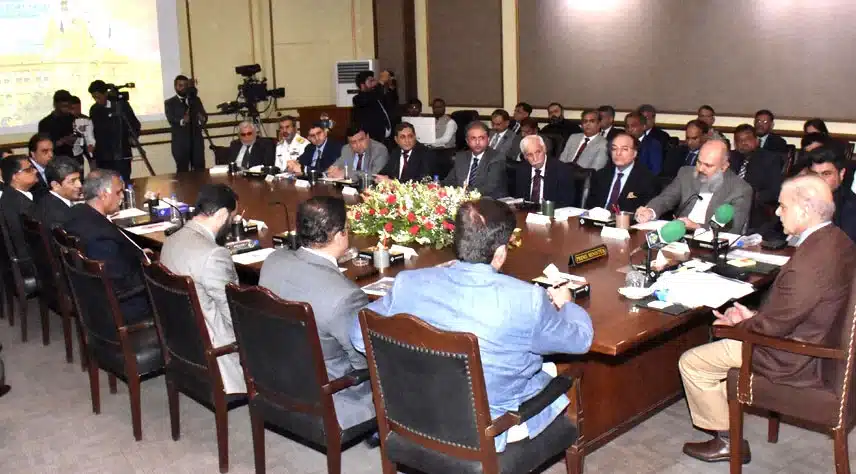Pakistan’s maritime ambitions took center stage recently. Prime Minister Shehbaz Sharif outlined his vision to transform the nation into a maritime hub for Central Asian trade. Following a series of high-level meetings with regional leaders, Sharif visited Karachi’s ports. He outlined a series of directives aimed at unlocking their full potential. This is a key pillar of Pakistan’s maritime ambitions.
Sharif Courts Central Asia
Sharif’s pronouncements carry particular weight in light of his recent diplomatic engagements. ‘Recently in Kazakhstan [during the SCO summit], I met several world leaders, including Russian President [Vladimir] Putin and heads of Central Asian states,’ the Prime Minister was quoted as saying. He highlighted the keen interest expressed by these nations in leveraging Pakistan’s ports for their trade activities. They recognize the potential of Pakistan’s maritime ambitions.
‘Central Asian states have expressed deep interest in using Pakistan’s ports for trade,’ Pakistan’s Prime Minister was quoted as saying by his office.
Pakistan: A Natural Gateway
This interest stems from Pakistan offering a potentially more efficient and cost-effective trade route compared to existing options. Several factors lend credence to this analysis. Firstly, Central Asian countries possess vast energy resources and raw materials. Pakistan offers a shorter and potentially more cost-effective trade route compared to existing options through China or Russia. Secondly, improved infrastructure and streamlined logistics at Karachi’s ports could significantly reduce transportation costs and transit times, making Pakistan an attractive proposition. Sharif emphasized that ‘Pakistan is the most effective trade route for the Central Asian countries’. By capitalizing on this strategic advantage, Pakistan’s maritime ambitions aim to establish the nation as an indispensable player in regional trade.
See also: Silk Route Reconnect – Pakistan and Uzbekistan Bringing Two Regions Together
Boosting Port Efficiency
To achieve this objective, Sharif outlined a comprehensive agenda focused on enhancing infrastructure and streamlining logistics at Karachi’s ports. These are crucial elements in advancing Pakistan’s maritime ambitions. He directed authorities to ensure round-the-clock cargo movement on the Lyari Expressway and to improve connectivity through the Malir Expressway. Additionally, he called for increasing rail freight capacity.
Beyond infrastructure, Sharif advocated for lower fees for Liquefied natural gas (LNG) ships at Port Qasim, aiming to bring them on par with international standards. He also urged for the implementation of a modern system and better accessibility at ports to enhance their capacity. These initiatives align with Pakistan’s maritime ambitions. Modernizing scanning equipment and expediting customs clearance procedures also featured prominently in his directives. These measures, he stated, would make Pakistan’s ports more attractive for international trade. They aim to unlock ‘billions of dollars in foreign exchange.’
Reforms and Partnerships
Sharif’s vision extends beyond infrastructure development; it also encompasses key reforms to bolster Pakistan’s maritime ambitions. He called for a comprehensive action plan to regulate shipping laws. He tasked the Pakistan National Shipping Corporation (PNSC) with formulating a plan to reduce costs and enhance operational efficiency. By addressing these internal challenges, Pakistan aims to solidify its position as a reliable and competitive player in the maritime sector. This furthers its maritime ambitions.
Further cementing Pakistan’s maritime ambitions is the burgeoning partnership with Tajikistan. Last week, on the sidelines of the Special Communication Organization (SCO) summit, PM Shehbaz invited Central Asian countries to “avail the facilities of Pakistani seaports” for transit trade, receiving a positive response from Tajikistan.
This emerging partnership, exemplified by discussions on establishing road and rail links, underscores the potential for Pakistan to become a crucial transit hub for Central Asian goods, fulfilling a key aspect of its maritime ambitions.
Challenges Remain
While aspirations run high, the road ahead for Pakistan’s maritime ambitions is not without obstacles. Addressing security concerns, ensuring the smooth flow of goods, and fostering an environment of transparency and efficiency will be crucial in attracting foreign investment and building trust with potential partners. The coming months will reveal whether Pakistan can translate its maritime ambitions into tangible results, transforming the nation into a true gateway for Central Asian trade.
This news story is covered by Najam ul Hassan, Junior Research Associate at South Asia Times (SAT).


![Afghan men search for victims after a Pakistani air strike hit a residential area in the Girdi Kas village, Nangarhar province on February 22, 2026. [Aimal Zahir/AFP/Getty Images]](https://southasiatimes.org/wp-content/uploads/2026/02/gettyimages-2262391441.webp)



